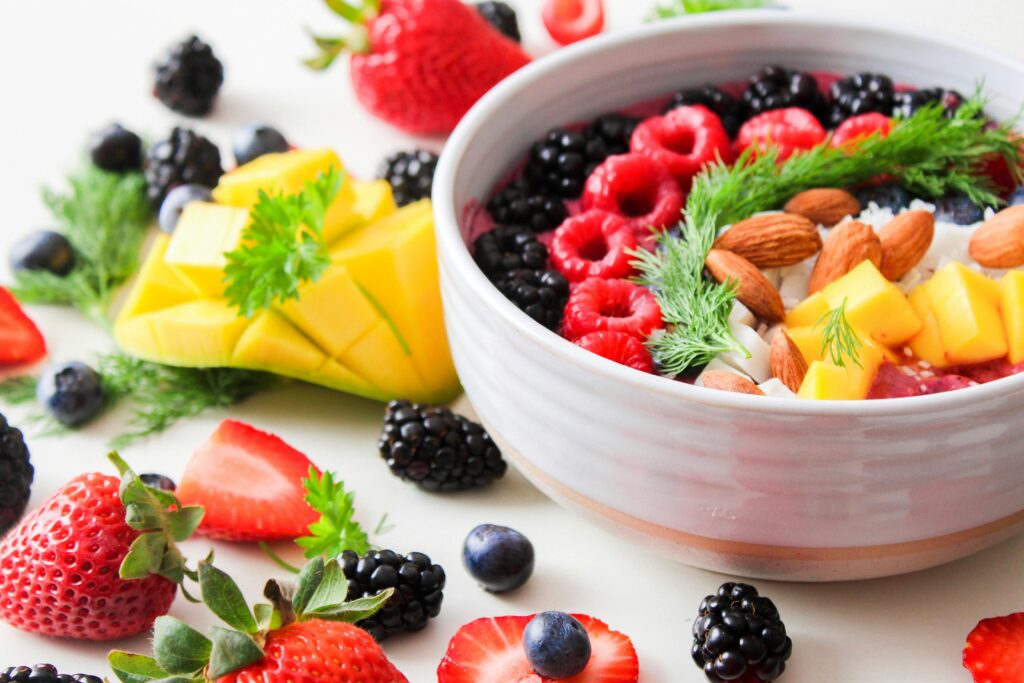Aging is a natural part of life, but how we age can be influenced by the lifestyle choices we make, especially when it comes to nutrition. As we grow older, our bodies change, and our nutritional needs shift to support healthy bones, muscles, and brain function, while also protecting against chronic diseases. A well-balanced diet rich in essential nutrients can play a crucial role in promoting healthy aging. Here’s a look at some of the best foods to include in your diet to support longevity and well-being as you age.
1. Leafy Greens: The Power of Nutrient Density
Leafy greens like spinach, kale, collard greens, and Swiss chard are packed with vitamins and minerals that are essential for aging well. These vegetables are rich in vitamin K, which plays a critical role in maintaining bone health by improving calcium absorption. Vitamin K also helps reduce the risk of osteoporosis, a common concern as we age.
In addition to bone health, leafy greens are loaded with antioxidants that protect cells from oxidative stress, which can contribute to aging. The high levels of folate in these greens also support cognitive function and may help reduce the risk of memory loss and dementia.
2. Fatty Fish: Omega-3s for Heart and Brain Health
Fatty fish like salmon, mackerel, sardines, and trout are some of the best sources of omega-3 fatty acids, which are vital for heart health. Omega-3s help reduce inflammation in the body, lower blood pressure, and prevent the buildup of plaque in arteries, reducing the risk of heart disease.
Moreover, omega-3s are linked to improved brain health. Studies suggest that they can help maintain cognitive function, reduce the risk of Alzheimer’s disease, and even combat age-related cognitive decline. Including fatty fish in your diet a couple of times a week can make a big difference in supporting both heart and brain health as you age.
3. Nuts and Seeds: Nutrient-Rich and Heart-Healthy
Nuts and seeds are excellent sources of healthy fats, protein, fiber, and antioxidants. Almonds, walnuts, chia seeds, and flaxseeds, in particular, are loaded with omega-3 fatty acids, vitamin E, and magnesium, all of which contribute to heart health and cognitive function.
Vitamin E is a powerful antioxidant that protects cells from damage caused by free radicals, which can accelerate aging and contribute to chronic diseases. Additionally, the fiber in nuts and seeds helps regulate digestion, which can often slow down with age, promoting better gut health and preventing constipation.
4. Berries: Antioxidant Powerhouses for Skin and Brain Health
Berries such as blueberries, strawberries, raspberries, and blackberries are bursting with antioxidants, particularly vitamin C and polyphenols, which help protect against cellular damage. This can slow down the aging process, particularly in terms of skin health, as antioxidants combat the effects of UV radiation and pollution that contribute to wrinkles and skin sagging.
In addition to their skin benefits, the flavonoids in berries have been shown to improve brain health, enhance memory, and reduce the risk of cognitive decline. Incorporating a variety of berries into your daily diet is a delicious way to support both skin and brain function.
5. Whole Grains: A Fiber Boost for Digestion and Heart Health
As we age, maintaining a healthy digestive system becomes increasingly important, and whole grains like oats, quinoa, brown rice, and barley are excellent sources of dietary fiber. Fiber helps promote regular bowel movements and reduces the risk of digestive issues, such as constipation and diverticulitis, which are more common in older adults.
Whole grains also help regulate blood sugar levels and lower cholesterol, making them a great choice for heart health. Additionally, the B vitamins found in many whole grains, such as folate and niacin, support energy production and cognitive function, both of which are crucial as we age.
6. Avocados: Healthy Fats for Skin and Heart Health
Avocados are packed with monounsaturated fats, which are known to support heart health by helping to lower bad cholesterol levels and maintain healthy blood vessels. These healthy fats are also essential for skin health, keeping it hydrated and reducing the appearance of fine lines and wrinkles.
In addition to healthy fats, avocados are rich in potassium, which helps regulate blood pressure and reduce the risk of stroke. Their creamy texture makes them an excellent addition to salads, sandwiches, or smoothies, offering a simple way to include heart- and skin-friendly nutrients in your diet.
7. Yogurt and Fermented Foods: Gut Health and Bone Support
As we age, our gut health can decline, leading to issues with digestion and nutrient absorption. Yogurt and other fermented foods like kefir, sauerkraut, and kimchi are rich in probiotics, which are beneficial bacteria that support a healthy gut microbiome. A balanced gut can improve digestion, boost the immune system, and reduce inflammation.
Yogurt, particularly, is also a great source of calcium and vitamin D, both of which are essential for maintaining bone density and preventing osteoporosis. Opt for unsweetened yogurt with live and active cultures to reap the maximum benefits.
8. Sweet Potatoes: A Nutrient-Dense Source of Carbohydrates
Sweet potatoes are a nutritious source of complex carbohydrates that provide a steady release of energy. They are rich in beta-carotene, a powerful antioxidant that the body converts into vitamin A. Vitamin A is essential for maintaining healthy vision and skin, both of which can deteriorate with age.
Sweet potatoes are also high in fiber, which aids digestion and helps control blood sugar levels, making them a great choice for those looking to maintain a healthy weight and energy levels as they age.
9. Legumes: Protein and Fiber for Muscle Maintenance
As we age, muscle mass tends to decline, making it essential to consume enough protein to maintain strength and mobility. Legumes such as lentils, beans, and chickpeas are excellent plant-based sources of protein. They are also rich in fiber, which supports digestion and helps manage cholesterol levels.
The combination of protein and fiber in legumes helps keep you feeling full longer, preventing overeating and promoting weight management. Additionally, legumes are rich in folate, iron, and magnesium, which support overall health and well-being.
Conclusion
Healthy aging isn’t just about avoiding diseases; it’s about maintaining physical, mental, and emotional well-being as you grow older. Incorporating nutrient-dense foods like leafy greens, fatty fish, nuts, berries, and whole grains into your diet can make a significant difference in how well you age. These foods provide essential vitamins, minerals, and antioxidants that protect against chronic diseases, improve cognitive function, and support skin, heart, and bone health.
A balanced and varied diet, coupled with regular physical activity and healthy lifestyle choices, can help you age gracefully, allowing you to enjoy life to the fullest in your later years.

